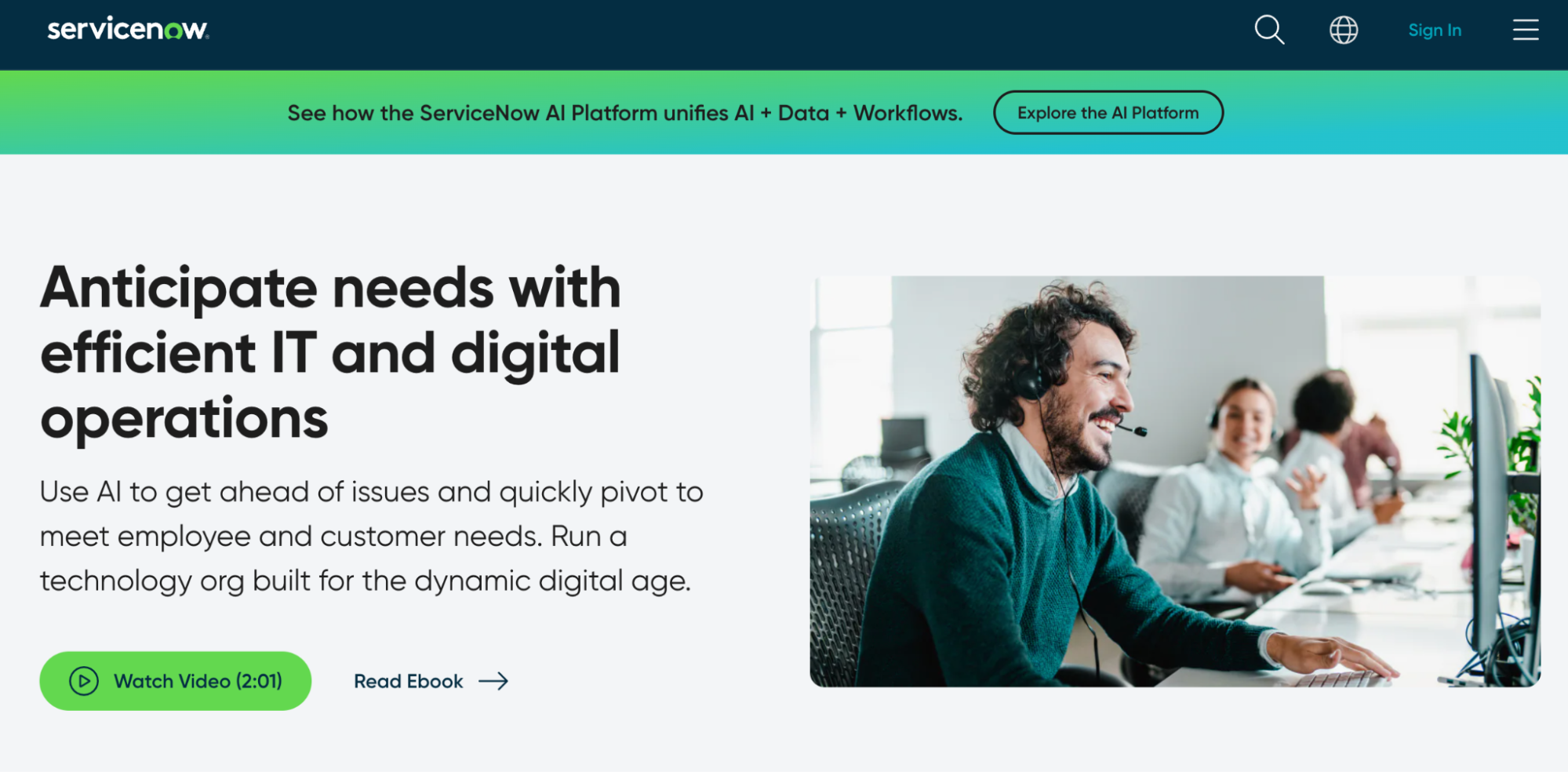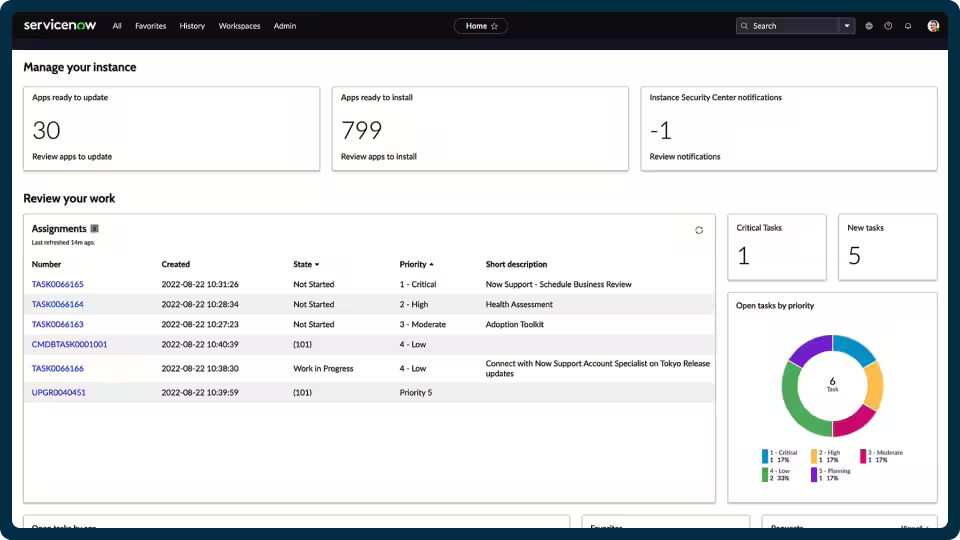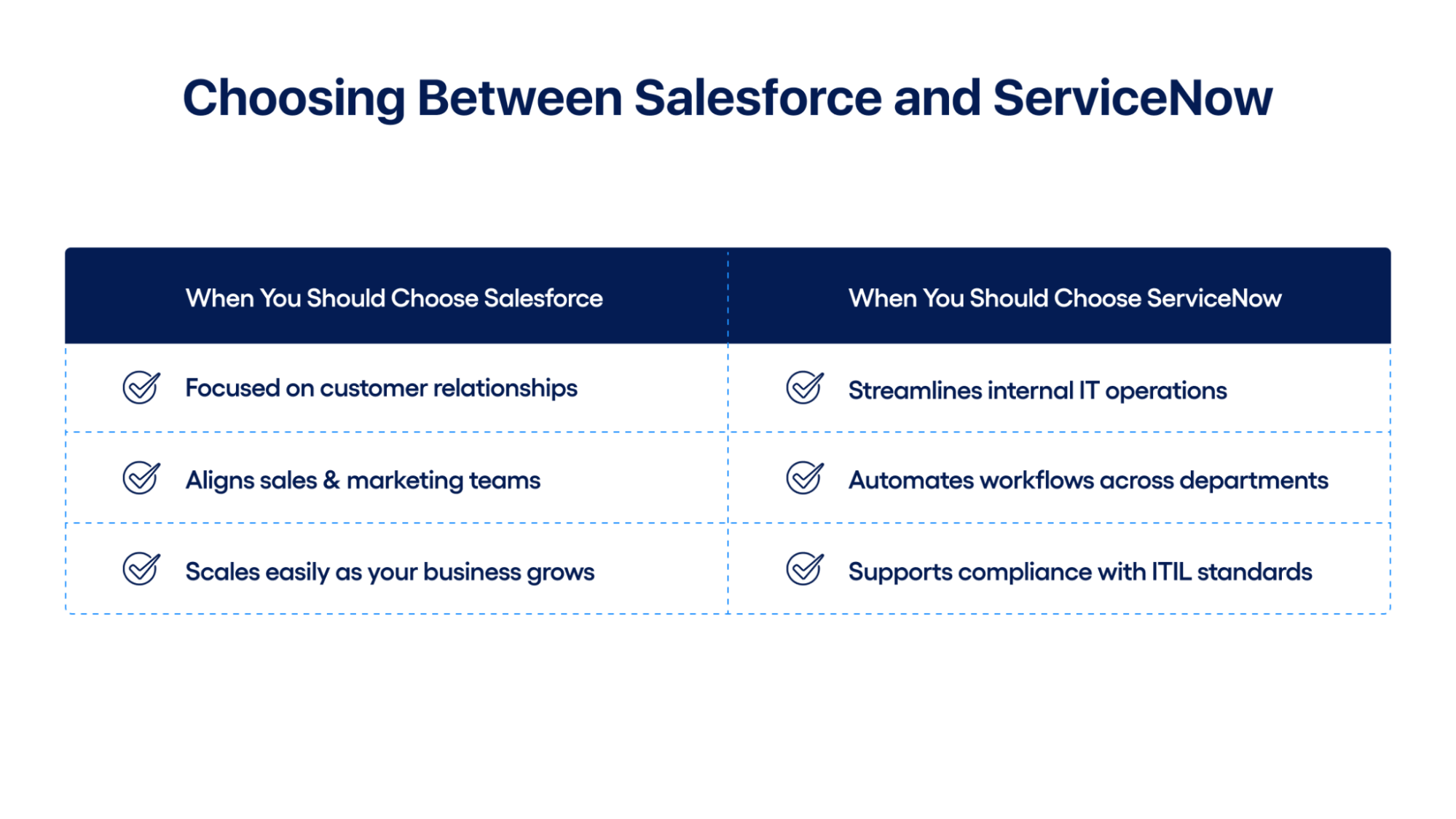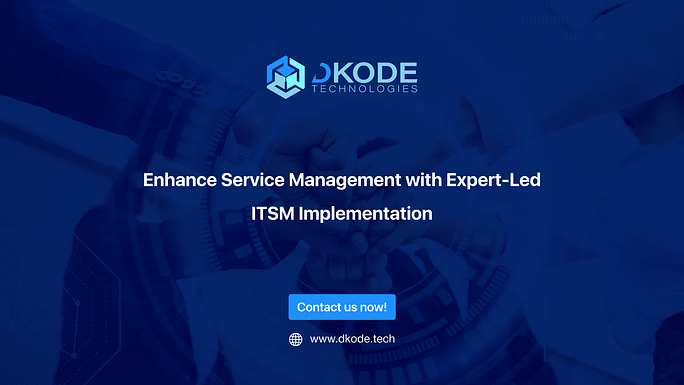Every modern business chases the same goals: stronger customer relationships, smarter operations, and faster execution. The challenge lies in choosing the right tools to achieve these goals.
Do you invest in a platform that helps you close more deals and delight your customers? Or do you prioritize automating internal operations, scaling IT support, and reducing service bottlenecks?
This is where Salesforce and ServiceNow become clear. These two enterprise giants serve fundamentally different but increasingly overlapping purposes.
Salesforce powers external engagement, helping companies connect with customers, personalize engagement, and drive revenue growth. ServiceNow dominates the IT Service Management (ITSM) space, empowering organizations to automate workflows, deliver seamless internal services, and run more efficiently at scale.
The lines between external customer experience and internal efficiency blur as organizations evolve. You need solutions that solve today’s pain points and scale with tomorrow’s complexity.
This blog outlines a breakdown of Salesforce vs. ServiceNow, covering everything from core functionalities and pricing models to real-world use cases and enterprise benefits. It will help you determine which platform best supports your business objectives or whether a dual-platform strategy could deliver greater long-term value.
Salesforce vs ServiceNow: Core Offerings
1. Salesforce

Source: Salesforce
Salesforce is a leading cloud-based CRM platform that helps businesses manage sales, marketing, and customer service. It offers scalable tools for customer engagement and business automation.
According to IDC, in 2023, Salesforce held a 21.7% share of the worldwide CRM market, making it the top CRM provider for the 11th consecutive year. The company leads in various segments, including sales, customer service, and marketing applications.
Core Offerings of Salesforce:
Salesforce’s platform offers a wide range of applications to support various aspects of customer relationship management and business operations:
- Sales Cloud: A tool for managing sales processes, including lead and opportunity management, sales forecasting, and performance analytics.
- Service Cloud: Focused on customer service and support, offering features like case management, knowledge bases, and omnichannel support.
- Marketing Cloud:Provides marketing automation capabilities, enabling personalized customer journeys across email, social media, and other channels.
- Commerce Cloud: Facilitates creating and managing e-commerce platforms, supporting B2B and B2C models.
- Einstein AI: Salesforce artificial intelligence layer that delivers predictive analytics and intelligent recommendations across its applications.
- Data Cloud: A unified data platform that integrates customer data from various sources, providing a comprehensive view for analysis and decision-making.
2. ServiceNow

Source: ServiceNow
ServiceNow is a cloud-based platform designed to streamline IT service management and automate enterprise workflows across IT, HR, and customer service functions.
ServiceNow has become a dominant player in the ITSM market. As of 2023, it held a 45.2% share of the global ITSM software market, leading the industry ahead of competitors like Atlassian and BMC Software.
Core Offerings of ServiceNow
ServiceNow’s platform is designed to digitize and automate workflows across various business functions:
- IT Service Management (ITSM): Provides tools for managing IT services, including incident, problem, and change management, aligning with ITIL best practices.
- IT Operations Management (ITOM): Focuses on monitoring and managing the health of the IT infrastructure, ensuring service availability and performance.
- Customer Service Management (CSM): Extends service management principles to customer support, enabling efficient case resolution and proactive service delivery.
- HR Service Delivery (HRSD): Automates HR processes such as onboarding, case management, and employee transitions, enhancing employee experiences.
- Security Operations (SecOps): Integrates security tools and processes to effectively respond to threats and vulnerabilities.
- Now Platform: The underlying platform supports application development, workflow automation, and integration across the enterprise.
Features of Salesforce and ServiceNow: What Each Platform Offers
Below is a breakdown of Salesforce’s and ServiceNow’s core features, highlighting what each platform offers to support different business needs.
1. Salesforce
CRM Capabilities
Salesforce enables tracking potential customers (leads) and their progression into opportunities. This includes managing contact information, communication history, and sales activities, and providing a comprehensive sales pipeline view.
The platform offers tools to predict future sales based on current data, helping businesses make informed decisions and set realistic targets. Salesforce provides features like email templates, task management, and integration with communication channels to enhance customer interactions.
Customer Service
Salesforce’s Service Cloud allows customer service across various channels, including phone, email, chat, and social media, ensuring consistent support experiences.
The system efficiently tracks and resolves customer issues, assigns cases to appropriate agents, and monitors resolution progress. Salesforce offers a repository for storing and accessing information, enabling customers and agents to find answers to common questions.
Marketing Automation
Salesforce’s Marketing Cloud enables the creation of targeted marketing campaigns based on customer data and behavior. The platform allows visualization and management of the customer’s interaction path, optimizing engagement strategies. Salesforce’s AI component provides predictive analytics and intelligent recommendations, assisting in sales forecasting, customer service, and marketing efforts.
2. ServiceNow
ITSM Features
ServiceNow’s IT Service Management (ITSM) suite helps to streamline and automate IT services, aligning with ITIL best practices.
Incident management facilitates the restoration of normal service operations promptly by managing unplanned interruptions or service degradations. It includes tools for logging, categorizing, and prioritizing incidents to ensure timely resolution.
Problem management focuses on identifying and addressing the root causes of recurring incidents to prevent future issues. It involves thorough analysis, documentation, and the implementation of permanent solutions. Change management manages the lifecycle of all changes in the IT environment, minimizing risk and impact. It includes planning, approval workflows, and post-implementation reviews to ensure successful transitions.
Request management streamlines handling user service requests through a centralized service catalog, such as access to applications or hardware provisioning.
Workflow Automation
ServiceNow’s platform enables the automation of complex business processes across various departments. It is a no-code/low-code tool that allows users to create and manage workflows, automating routine tasks and approvals without extensive programming knowledge.
Robotic process automation (RPA) integrates with legacy systems to automate repetitive tasks, enhancing efficiency and reducing manual errors. Integration hub provides pre-built connectors to integrate ServiceNow with external systems, facilitating seamless data exchange and process automation across platforms.
Enterprise Service Management (ESM)
ServiceNow extends its service management capabilities beyond IT to other business functions. Human resources (HR) service delivery automates HR processes such as onboarding, offboarding, and employee inquiries, improving the employee experience and operational efficiency.
Finance operations streamlines financial workflows, including expense approvals and budget management, ensuring compliance and transparency. Facilities management manages maintenance requests, space planning, and asset tracking, enhancing the management of physical resources. Legal and procurement services automate contract management, legal requests, and procurement processes, reducing cycle times and ensuring policy adherence.
AI Integration
ServiceNow incorporates artificial intelligence to enhance decision-making and operational efficiency. Predictive intelligence utilizes machine learning to automatically categorize, prioritize, and assign tasks, improving response times and service quality.
AI-powered chatbots handle common user inquiries, providing instant support and freeing up human agents for more complex issues. Performance analytics offers real-time dashboards and reports, enabling organizations to monitor key performance indicators and make data-driven decisions.
Salesforce vs ServiceNow: Essential Differences That Impact Your Business Decision
The following comparison outlines the essential differences between Salesforce and ServiceNow to help you determine which platform best aligns with your business goals.
1. Primary Focus
Salesforce focuses on customer relationship management (CRM). Salesforce offers tools for sales, marketing, and customer service teams to manage external customer interactions and relationships.
On the other hand, ServiceNow is focused on internal service management. It provides solutions for IT service management (ITSM), human resources (HR), finance, and other departments to streamline internal workflows and processes.
2. Customization
Salesforce offers extensive customization options for CRM-related processes, allowing businesses to tailor sales pipelines, marketing campaigns, and customer service workflows to their needs.
ServiceNow provides robust customization capabilities for internal workflows. Users can design and automate processes across various departments using tools like Flow Designer and App Engine Studio, enabling the creation of tailored solutions without extensive coding.
3. Integration Ecosystem
Salesforce AppExchange is a comprehensive marketplace offering thousands of third-party applications and integrations to extend Salesforce CRM functionalities. It allows businesses to enhance their Salesforce environment with additional tools for various business needs.
ServiceNow IntegrationHub is a powerful platform enabling seamless connectivity between ServiceNow and external systems. IntegrationHub offers pre-built connectors, known as “spokes,” for standard applications and allows custom integrations to be created, facilitating end-to-end automation across enterprise systems.
4. User Experience
Salesforce features a user-friendly interface designed for sales and marketing professionals. The platform emphasizes ease of use, intuitive navigation, and customizable dashboards to manage customer interactions effectively.
ServiceNow offers a more technical interface for IT professionals and internal service teams. It provides customizable dashboards, detailed analytics, and tools like the UI Builder to create personalized workspaces, enhancing the management of internal processes and services.
Deploying Salesforce and ServiceNow: Use Cases and Industry Applications
Below are Salesforce and ServiceNow’s use cases and industry applications, highlighting how each platform delivers value across different business functions.
Salesforce
1. Retail
Salesforce Marketing Cloud and Loyalty Management tools enable retailers to create personalized shopping experiences and robust loyalty programs. By leveraging customer data, retailers can segment audiences, tailor promotions, and engage customers across multiple channels.
Goodwine, a Ukrainian healthy food and drink retailer, implemented Salesforce to support its customer loyalty program. By integrating Salesforce with its ERP system, website, and mobile app, Goodwine achieved a 60% increase in website conversion rates over three years.
2. Financial Services
Salesforce Financial Services Cloud provides financial institutions with a unified view of client data, aiding in relationship management and regulatory compliance. The platform streamlines workflows, enhances client interactions, and ensures adherence to industry regulations.
For example, Zurich Insurance Group launched an AI-powered CRM system integrated with Salesforce to enhance agent efficiency and customer service. The system centralizes customer data and uses AI to recommend suitable insurance products, reducing service times by over 70%.
3. Healthcare
Salesforce Health Cloud enables healthcare providers to deliver personalized patient experiences by consolidating clinical and non-clinical data. The platform supports care coordination, patient engagement, and improved health outcomes.
Piedmont Healthcare utilized Salesforce Health Cloud to create a 360-degree view of patients, enhancing access and efficiency. The integration allowed for personalized care and improved patient and physician engagement.
ServiceNow
1. IT Departments

Source: ServiceNow
ServiceNow IT Service Management (ITSM) suite assists IT departments in efficiently managing incidents, problems, and service requests. The platform automates workflows, ensuring timely resolution and improved service quality.
For instance, a global retail company adopted ServiceNow Incident Management, which resulted in a 45% reduction in incident response time. This improvement led to increased operational efficiency and significant cost savings.
2. Human Resources

Source: ServiceNow
ServiceNow HR Service Delivery (HRSD)module automates HR processes, including employee onboarding, case management, and transitions. The platform enhances the employee experience by streamlining tasks and reducing manual efforts.
Cars.com implemented a new employee onboarding app integrated with ServiceNow, automating HR, IT, and facilities processes. This initiative saved HR managers 300 hours annually and ensured 90% of new employees completed onboarding steps on their first day.
3. Management

Source: ServiceNow
ServiceNow Workplace Service Deliverysolution aids in managing facilities by automating maintenance requests, asset tracking, and space planning. The platform ensures efficient coordination of maintenance activities and resource utilization.ServiceNow
Organizations use ServiceNow to manage facility maintenance by creating assets, assigning tasks, and setting priorities. This allows facility managers to focus on asset management, ensuring timely repairs and compliance with safety regulations.
Salesforce vs ServiceNow: Comparing Licensing Models and Costs
Choosing between Salesforce and ServiceNow depends on your organization’s needs and priorities. Here’s how you can decide which platform fits your business best.
1. Salesforce
Salesforce operates on a subscription-based pricing model, where the selected edition and the number of users determine costs. Each edition offers different features, allowing businesses to choose the one that best suits their needs.
Sales Cloud Editions:
- Essentials: Designed for small businesses, offering basic CRM functionalities.
- Professional: Includes complete CRM capabilities for any size team.
- Enterprise: Provides advanced customization and automation tools.
- Unlimited: Offers unlimited CRM power and support.
Each edition is priced per user, per month, with costs increasing based on the level of functionality and support included.
Common Licensing Models:
Role-Based Licensing: Licenses are assigned based on user roles within the platform.
- Requester: Users who submit requests or incidents, often free of charge.
- Professional: Users who can approve or reject requests; typically require a paid license.
- Fulfiller: Users who work on and resolve tasks; requires a paid license.
- Unrestricted User: Users with full access across modules; requires a paid license.
Module-Based Licensing: Licenses are purchased for specific modules such as IT Service Management (ITSM), Human Resources Service Delivery (HRSD), or Customer Service Management (CSM).
Remember that the breadth of modules and functionalities implemented will directly impact licensing costs when planning for ServiceNow licensing. Accurately defining user roles ensures appropriate licensing and avoids unnecessary expenses. Ongoing support services and platform maintenance are included in the subscription but may vary based on the agreement.
Engaging with a ServiceNow sales representative can provide a customized quote based on your organization unique needs and usage patterns. At DKode Technologies, we deliver tailored ServiceNow solutions beyond standard implementation, focusing on automation, process optimization, and scalable service management.
Choosing Between Salesforce and ServiceNow: Which Platform Aligns with Your Strategy?

Choosing between Salesforce and ServiceNow depends on your organization needs and priorities. Here is how to make an informed decision about the appropriate platform.
When You Should Choose Salesforce
- Customer Relationship Management (CRM): If your main priority is strengthening customer relationships, managing sales pipelines, and running targeted marketing campaigns, Salesforce offers the robust CRM tools you need.
- Sales and Marketing Alignment:If aligning your sales and marketing teams is a goal, Salesforce provides integrated tools that help both departments collaborate effectively and drive unified outcomes.
- Scalability: As your business grows, you’ll benefit from Salesforce’s scalable infrastructure, which can grow with your expanding customer engagement needs.
When You Should Choose ServiceNow
- IT Service Management (ITSM): If your focus is improving internal IT operations and streamlining service delivery, ServiceNow helps you automate workflows and manage incidents more efficiently.
- Enterprise Workflow Automation:ServiceNow provides powerful tools for enterprise-wide automation, making it easy to simplify and standardize processes across departments like HR, finance, and facilities.
- Compliance and Governance: If your organization must adhere to strict regulatory standards, you’ll appreciate ServiceNow’s alignment with ITIL best practices and its support for governance frameworks.
When a Hybrid Approach Makes Sense
Some organizations benefit most from using both platforms together. Here’s how you can leverage them side by side:
- Front-End and Back-End Integration: Use Salesforce to handle customer-facing activities like sales, marketing, and support, while relying on ServiceNow to manage internal operations and IT services.
- Data Synchronization: By integrating both platforms, you can create a seamless data flow between customer interactions and internal processes, giving you a unified, real-time view of business performance.
- Enhanced Customer Experience:Connecting Salesforce’s CRM insights with ServiceNow’s operational workflows ensures that internal teams can act quickly on customer feedback, leading to faster improvements and better experiences.
Your choice between Salesforce and ServiceNow should align with your organization’s specific operational needs and strategic goals. Evaluating the core functionalities of each platform regarding your business processes will guide you toward the most suitable solution.
Enhance Service Management with Expert-Led ITSM Implementation

At DKode Technologies, we help organizations structure, scale, and streamline service delivery using the ServiceNow platform. But our work extends beyond support; we connect internal workflows with external demands to deliver measurable outcomes across teams.
Our certified ServiceNow professionals and ITIL Practitioners bring deep industry expertise and a proven ability to solve complex challenges. What sets us apart is our technical expertise and a strong, collaborative team culture built on trust, shared learning, and a commitment to excellence.
We support organizations across multiple service areas:
- Enterprise IT Solutions – End-to-end IT services including ITSM, ITAM, CMDB, and Security Operations tailored for enterprise efficiency and resilience.
- Software Development Solutions – Custom software solutions built to meet unique business needs with speed, flexibility, and scalability.
- Managed Support Services – Reliable, ongoing technical support to maintain system stability and ensure optimal performance
- Customer and Industry Solutions – Tailored ServiceNow CSM solutions to enhance customer experiences
- Asset Management – that offers complete visibility into hardware, software, and services—enabling accurate tracking, better control, and more efficient planning.
- IT Operations Management (ITOM) – to monitor systems, prevent disruptions, and ensure consistent performance across environments
By combining ITSM, CSM, and ITOM, we help businesses move faster, work smarter, and scale confidently, backed by a team as invested in your success.
Contact Us